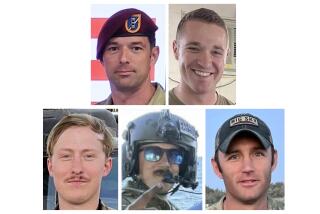Charlie Liteky, Army chaplain who gave back Medal of Honor and became peace activist, dies at 85
Charlie Liteky, an Army chaplain in Vietnam who was awarded the Medal of Honor for rescuing more than 20 wounded men but later gave it back in protest and became a peace activist, has died.
Liteky died Friday at the Veterans Administration Hospital in San Francisco, said longtime friend Richard Olive. He was 85.
Liteky was awarded the nation’s highest military decoration for his actions on Dec. 6, 1967, when his company came under intense fire from an enemy battalion in Bien Hoa province. Despite painful wounds in the neck and foot, Liteky carried more than 20 men to the landing zone to be evacuated during the fierce firefight.
“Noticing another trapped and seriously wounded man, Chaplain Liteky crawled to his aid,” the Army’s official citation reads. “Realizing that the wounded man was too heavy to carry, he rolled on his back, placed the man on his chest and through sheer determination and fortitude crawled back to the landing zone using his elbows and heels to push himself along.”
Liteky left the priesthood and in 1983 married former Catholic nun and peace activist Judy Balch in San Francisco. His wife introduced him to refugees from El Salvador, “teenagers, whose fathers had been killed and tortured. I didn’t believe it, but I kept going to more and more of these meetings and it became clear these people weren’t blowing in the wind,” Liteky told the San Francisco Chronicle in a March 2000 interview.
Nearly 20 years after his heroic actions in Vietnam, Liteky left the Medal of Honor — awarded under the name of Angelo J. Liteky — and a letter to President Reagan at the Vietnam Veterans Memorial in Washington in protest of the country’s foreign policy in Central America, where U.S.-backed dictators were fighting bloody wars against left-leaning rebels.
After that, Liteky spent years protesting against the U.S. Army School of the Americas, an academy at Fort Benning, Ga., where the U.S. Army trained soldiers from Central and South America and the Caribbean. He was sentenced to one year in federal prison in 2000 for entering the school without permission and splashing its rotunda with blood.
In 2003, he traveled to Baghdad with other peace protesters to bear witness to the war and work with children in an orphanage and at hospitals.
Olive said Saturday that he remembers Liteky for his humility. “It was three years after I met Charlie and bonded a fast friendship that I learned he was a Medal of Honor recipient” when Liteky told him about his plans to renounce the medal, Olive said.
More to Read
Start your day right
Sign up for Essential California for the L.A. Times biggest news, features and recommendations in your inbox six days a week.
You may occasionally receive promotional content from the Los Angeles Times.






